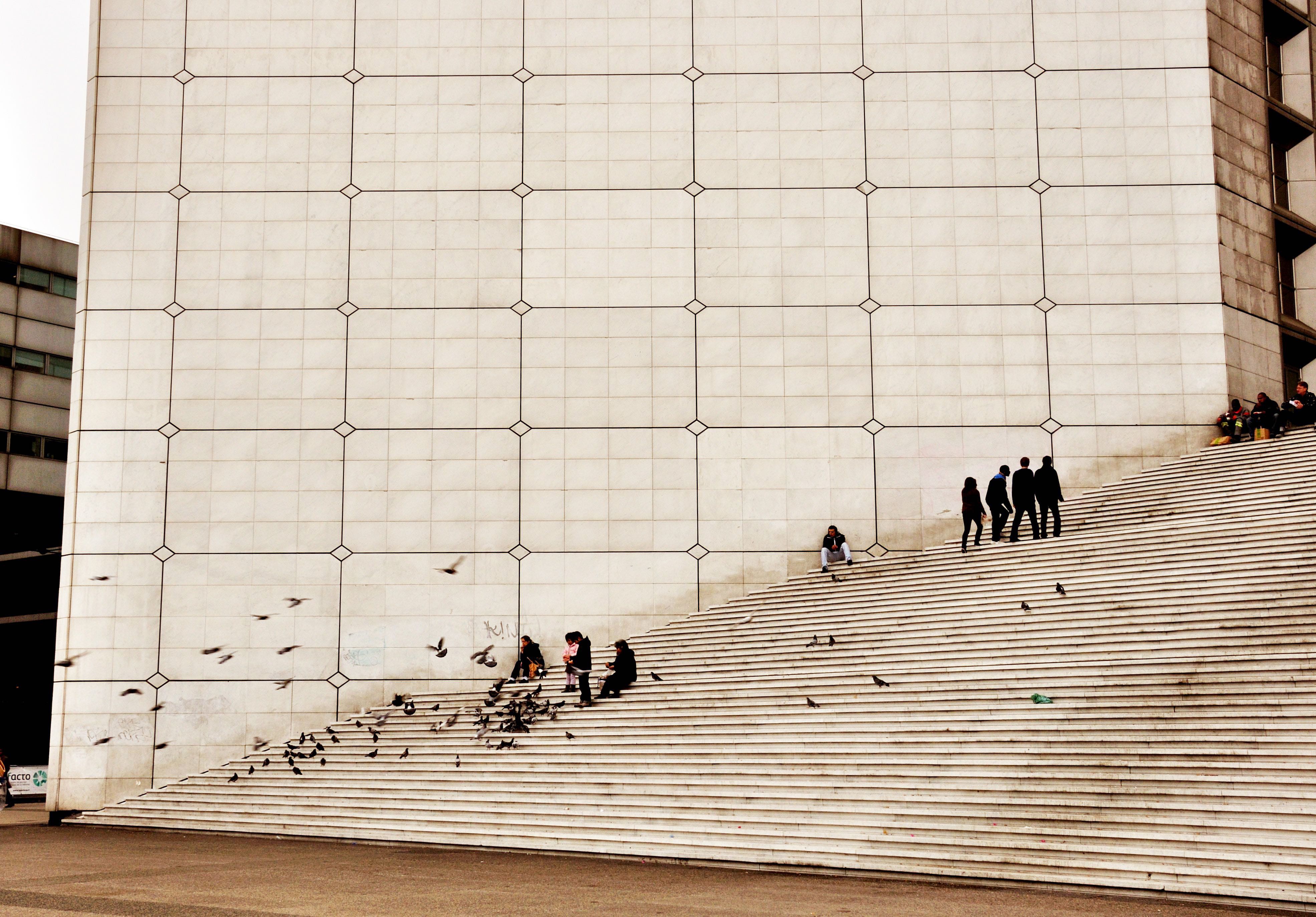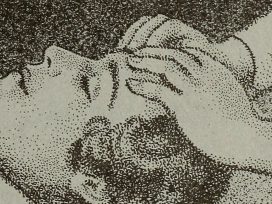As the social and economic violence of inequality intensifies, contemporary French literature is charting new territory in the face of the partial failure of social activism and the conquests of aggressive economic liberalism, writes Nicolas Léger. Collective utopias may be done for; humour, the carnivalesque and gestures of solidarity remain.
Inequality is flourishing and deepening: scenes of misfortune and social injustice roll on an endless loop across our screens and social networks. There is something indecent about the way the spectacle follows the rhythm of the news cycle, the way it drapes itself in figures, statistics, graphs and expert opinions. Inequality is sometimes presented as an inevitable consequence of a market-based system, and sometimes seized upon as an opportunity for arousing short-lived outrage or compassion. Meanwhile, discussions of growing inequality are only too quick to obscure the lives, the individual stories that play out behind it. In a world of ‘universal reportage’ it is literature’s sole privilege to give experiences a human voice or to weave unexpected, heterogeneous or complementary networks of meaning and interpretation.
Although there is a French tradition of social narrative that follows in the footsteps of Émile Zola’s naturalism or Victor Hugo’s epics, contemporary novels no longer seem to have their sights set on a radiant, just future. Many of them are more disillusioned in tone and tap into a collective sense of the loss of an ideal while attempting to explore the genealogy and effects of that loss. Perhaps this is because, nowadays, the simple fact of acknowledging inequality as a symptom of our contemporary malaise, of reclaiming language to counter the alienation of a market-oriented world, is already an act of resistance against the degradation of our societies.
The narratives of inequality in contemporary French literature are so varied that it would be presumptuous to try to produce an exhaustive overview. Moreover, although these narratives are specifically French in terms of their settings, the forms of social collapse they depict and the characters that people them, in this globalized age they also draw on narrative paths explored particularly by American novelists. How does this strand of French contemporary literature make pessimism and disenchantment its own while still managing to chart new horizons? What changes to the social model do these narratives document? Only one thing is certain: the age of collective utopias is over.

At the foot of the La Grande Arche de la Défense, also known as La Grande Arche de la Fraternité, in the business district of La Défense. Photo source: Flickr
New social spaces
There are several possible explanations for writers’ seeming reluctance to tackle inequality:sociological distance, insufficiently novelistic material, publishers’ preferences… More importantly, doing so is a gamble: writers can easily find themselves accused of miserabilism or self-serving pseudo-commitment, to say nothing of the inevitable comparisons with their American counterparts,heirs of an uninterrupted tradition. Whatever the reason, it seems that social malaise is no longer able to support fiction or pathos. The French frown upon those who use inequality as a pretext instead of producing fully engaged texts. In a country where egalitarianism is part of the national heritage, inequality has already been over-exploited by political, commercial and sensationalist discourses. The partial failure of social activism and the conquests of an aggressive economic liberalism have also fostered suspicion of collective utopias as a purely sentimental response to inequality. Nevertheless, French literature of the early twenty-first century has produced something like a cartography and genealogy of inequality, both economic and social. Deindustrialization, the impoverishment of suburban areas and the reconfiguration of urban spaces are all phenomena explored by these literary works.
François Bon, author of the novels Sortie d’usine (‘Factory exit’, 1982) and Daewoo (2004), has since the 1980s consistently given linguistic expression to these mutations and ruptures: for example, in the industrial world or the banlieues. The demanding nature of his rich and multifaceted work calls the reader’s attention to the creative ethic of an author who refuses to be pigeonholed as a writer ‘about’ the underprivileged, the working class or the marginalized. Having founded writing workshops and websites, his work is informed by time spent talking and listening to people the world no longer hears or wants to see. The hybrid form of his narratives, where fiction blends seamlessly with surveys and documentary accounts, provides protection against an overarching or essentializing perspective that might otherwise miss the intimate traces of inequality as they appear in different French environments and landscapes.
This search for an ethically sound way to describe the abandonment of the suburbs and its human disaster, invisible to the media, also characterizes Alexis Jenni’s La Nuit de Walenhammes (‘The night of Walenhammes’, 2015). An account of the dereliction and cynicism that ravage deindustrialized zones, the novel plunges a precariously employed journalist, a fragile observer, into a fictional town in northern France. Discoveries, encounters, the intertwining of political rhetoric, slogans, the words of residents, globalization’s losers or winners – all these are attempts to hold within the dense structure of the novel a phenomenon that forever spills out of its grasp. Burning swimming pools and murders add a cruel, carnivalesque dimension to the chaos and despair assured to those whose dignity is stripped away by economic globalization. The novel’s ending ironically emphasizes the indifference and fatalism that accompany social collapse, as if there was indeed ‘no alternative’ – a bewitching slogan that maintains its victims in a state of indolence and delusion. Inequality is a slow but lethal poison: ‘Inequality is toxic, psychologically, socially, economically. It gnaws, the cogs jam, society as a whole becomes inefficient. When wealth stays put, poverty spreads everywhere; except to those who end up with it all, the winners, the supremely inegalitarian.’
Modernity at the end of the road
Trial by ordeal is never far away in representations of inequality, like a barren field ready to ignite with a single spark. Gérard Mordillat’s La tour abolie (‘The abolished tower’, 2017) is set in La Défense, the major business district just outside the city limits of Paris. The novel is a dark fable of the nihilistic rebellion of reclusive, animalized beings who live in the basement of a skyscraper, scavenging the leftovers of the privileged. When the managers’ cafeteria is closed as a cost-saving measure, violence breaks out in the tower – a metaphor for an inegalitarian, hierarchical society whose wilfully ignored rotting foundations make its collapse inevitable. Tristan Egolf’s masterpiece, Lord of the Barnyard (2000), is a notable forerunner of these narratives of violence bordering on farce. It describes the revenge of the young John Kaltenbrunner, who, exploited and humiliated, incites a rebellion in a small town in the American South by rallying the town’s impoverished and despised bin men. Once again we encounter the image of the ‘residue’, the ‘remains’ that, having been banished to enable the social sphere to function properly, then return with destructive force. The carnivalesque in these narratives is a reversal where a vengeful federation of the weak completes a slow process of decay, sweeping everything aside in its path and leaving no opportunity for the restoration of a peaceful and cohesive community.
Two bodies of work, both particularly symptomatic of the bankruptcy of egalitarianism and the triumph of individualism against a background of Western resignation, have been hugely successful both in France and elsewhere (a sign that they resonate deeply in an era of globalization and crisis). Virginie Despentes and Michel Houellebecq, each in their idiosyncratic way, do not just describe these social changes and their effects, but have also set about identifying their horizons, or the possibilities of survival beyond them. They take the way the naturalist novel depicts society and adapt it to suit their purposes, adding imagery and narrative techniques borrowed from a strand of English-language literature hitherto referred to condescendingly as ‘popular’. But it is precisely these influences, the product of a counterculture born out of globalization and the twentieth century, that enable them to bear the weight of the singularities of our contemporary modernity: science fiction in Houellebecq’s Atomised (1998), futuristic dystopian narrative in his Submission (2015), or crime noirin Despentes’s Vernon Subutex (2015–2017).
These authors have not been selected at random: one imagines the relentless degradation of an economic and technological modernity that has reached the end of the road, while the other tries to restore a voice to the humiliated, those who have ended up the losers in a violent and cruel society. The apathy of the Houellebecquian middle manager or the fits of rage and resignation of those on the fringes of society open up vistas across the entire social sphere of modern France. The portrayal is sombre and pessimistic: the domination of bodies and intimacies by market forces, the exhaustion of desire, the concentration of wealth and privilege leading to the disintegration of solidarities and the breakdown of social justice. Although Houellebecq’s cold, jaded, almost analytical style seems the polar opposite of Despentes’s punchy, furiously musical and slang-fuelled prose, they are both at work on the same task: offering a sweeping panorama, a lucid fresco of a sense of disillusionment that first appeared in the 1980s. Both authors imbue their language with the breath and the breathlessness of a generation that has always known it was lost. The individual may be king, but he is a king with no clothes ruling over an emotional and existential desert: alone and dying in illusory and anaesthetizing comfort, except when he is being crushed and excluded. The individual is all at sea in an inegalitarian world, keenly aware of her own impotence, or worse, the lack of any desire to rebel against a hegemonic order and a permanent state of social violence.
In the saga of Vernon Subutex, a vision unfolds of a French society that has been torn apart by hatreds and social betrayals, its motto of ‘Liberty, Equality, Fraternity’ battered from all sides. The failure of socialism, the liberal turn, the rise of the National Front and class and identity struggles all feed into a general sense of every man for himself. These individualisms find a voice in this polyphonic narrative with its roots in the 1980s. The French egalitarian model has fallen away, leaving in its place a social jungle:
In the same way that kids in the banlieue torch the cars outside their own tower blocks and never invade the sixteenth arrondissement, the Frenchman in dire straits takes it out on the person sitting next to him on the bus. Even in his irritation, he is passive: last night, on TV, he was informed that there are people worse off than he is, people who are poorer and deeper in debt: the stinking Black guy, the murderous Muslim, the thieving Rom. Meanwhile, the true culture of the French people – social heritage, the national education system, the great political theories – has all been deliberately dismantled. The greatest achievement of the dictatorship of the one per cent has been its ability to manipulate minds.
Preserving what’s missing
Houellebecq’s Whatever (1994) had already pointed to the domination of the market over the soul, while Platform (2001) offered a portrayal of the West in its death throes exploiting a poor, young Global South. The Map and the Territory (2010) depicted a deindustrialized France destined to become a bleak open-air museum and Submission, a political satire, imagines a French society shattered by communitarian movements and in the midst of an identity crisis. Religion and the market are presented as the regulators of society, a role they were able to assume following the final abandonment of solidarity and the collectivist dream. A second-rate hedonism and an infantile consumerism are all that survive in these narratives of the total entropy of the human community. The few pockets of solidarity – ‘possibilities of an island’, as Houellebecq would say– are precarious and confined to interpersonal relationships that are destined to fail: romantic attachments that offer a fleeting glimpse of authenticity in Houellebecq or moments of group, sectarian or tribal belonging found in dance or music in Despentes. But make no mistake, this sort of thing almost always ends badly, beaten back by a resurgent individualism. Given the impossibility of establishing real relationships between subjectivities permeated by the economic paradigm and the explosion of identity in the struggle of each against all, conflict resolution in a state of calm equilibrium is an unattainable goal.
We should not expect narratives to give us a comprehensive panorama of inequality or to have prophetic qualities. In this overview of the French literary landscape, the representations of inequality and the scenes depicted are tinged with nihilism. And yet they are never completely without humour, as if this were a necessary buffer against anger. Indeed, the novel’s and writer’s stubborn insistence on shaping language and the narrative perspectives that provide a temporary escape from the suffocation of the present bear witness to past losses while imagining an ‘after’. These French narratives, sensitive to their time, are suffused with a despair that goes beyond mere imprecation: the illustration of possibilities, the attention paid to what is currently self-destructing before our eyes are an attempt to preserve what is lacking in texts. Our world is not in crisis, it is crisis, just like literature: precariousness as a gesture of solidarity, even if only through the creation of significant sociological tableaux.







